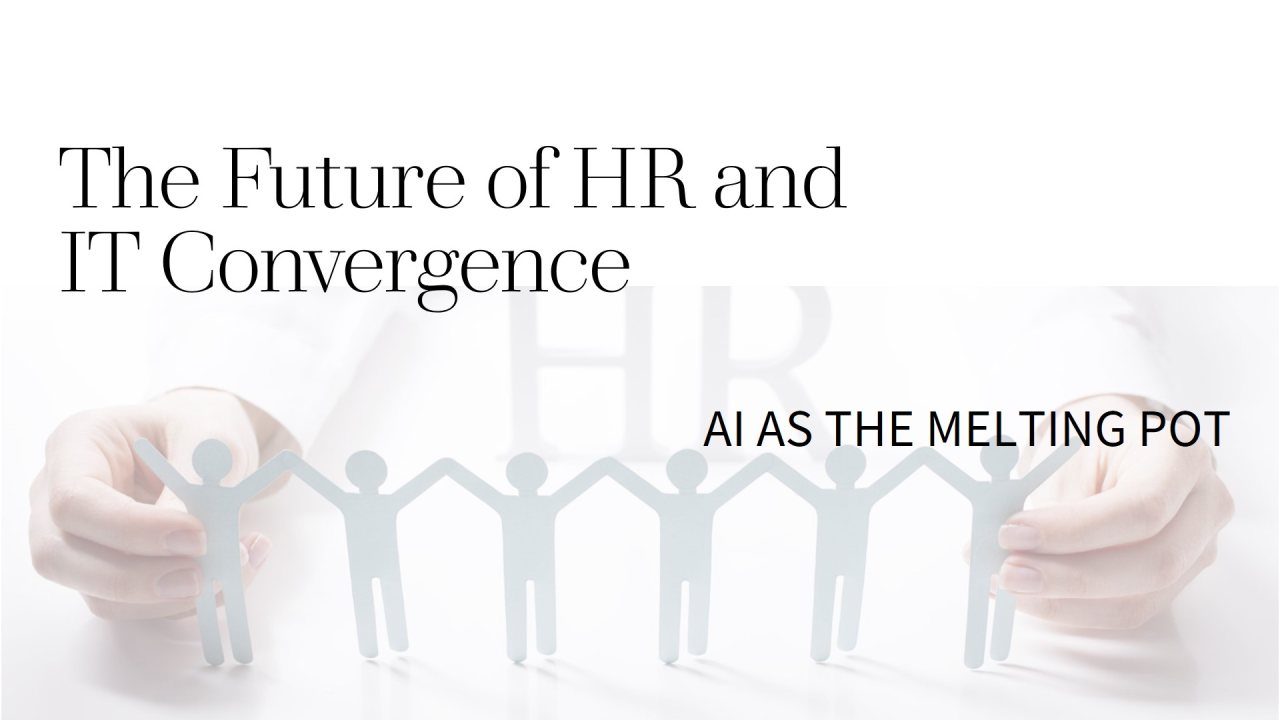The is so much buzz of AI everywhere but the most change will come in HR and IT departments as these will change fast creating new ways these departments function.
The fusion of Human Resources (HR) and Information Technology (IT) in the era of AI, highlighting the transformative effect of AI on organizational structures and the evolving nature of workplace management. The concept of "Human Intelligence & Technology Integration" reflects the blend of human-centric HR functions with technology-driven IT processes, underlining the collaborative and interconnected role of these previously distinct areas. This new convergence is poised to redefine not just departmental responsibilities but also the landscape of HR outsourcing, paving the way for more technologically integrated and strategically focused HR services.
Indeed, AI is increasingly becoming an integral extension of HR services, as it brings a new dimension to how human resources are managed and optimized. Here's an analysis of how AI acts as an extension to traditional HR services:
1. Automation of Routine Tasks
- AI in Recruitment: AI streamlines the recruitment process by automating resume screening, scheduling interviews, and even conducting initial candidate assessments.
- Employee Onboarding: Chatbots and AI-driven platforms can facilitate quicker and more interactive onboarding experiences.
2. Data-Driven Decision Making
- Talent Analytics: AI tools analyze large datasets to identify trends and patterns, helping HR professionals make informed decisions about talent management, workforce planning, and employee retention strategies.
- Performance Management: AI can offer insights into employee performance, identifying areas for improvement or development.
3. Enhanced Employee Experience
- Personalization: AI enables a more personalized experience for employees, from tailored training programs to individualized career path suggestions.
- Employee Engagement: AI-driven surveys and feedback tools can provide real-time insights into employee morale and engagement levels.
4. Predictive Analytics
- Forecasting Trends: AI can predict future trends in the workplace, such as emerging skill requirements, enabling proactive upskilling and reskilling of the workforce.
- Risk Management: Identifying potential HR risks, like turnover or compliance issues, before they become problematic.
5. Facilitating Remote and Hybrid Work
- Virtual Collaboration: AI tools can enhance remote work by optimizing scheduling across time zones, recommending collaboration tools, and even analyzing communication patterns for better team dynamics.
6. Bias Reduction in HR Processes
- Fair Recruitment: AI can help minimize unconscious bias in hiring by focusing on skills and experience rather than subjective criteria.
- Diversity and Inclusion: AI-driven analytics can monitor and promote diversity and inclusion within the organization.
7. Continuous Learning and Development
- Adaptive Learning Platforms: AI can create customized learning experiences for employees, adapting to their learning pace and style.
- Skill Gap Analysis: Identifying and addressing skill gaps within the workforce through targeted training initiatives.
8. Legal and Compliance Assurance
- Regulatory Compliance: AI tools can stay updated with the latest HR-related laws and regulations, ensuring the company remains compliant.
Implications for HR Professionals
- Role Evolution: The role of HR professionals is evolving from administrative to more strategic functions, aided by AI.
- Skill Development: There's a growing need for HR professionals to develop skills in AI and data analytics.
Even most of the HR activities will shift to SAAS solution providers that will offer services like AMC for equipments .
The future of HR outsourcing, influenced by technological advancements, is likely to evolve significantly, potentially resembling Annual Maintenance Contracts (AMC) for equipment. Here are some key aspects that might shape this future:
- Technology-Driven Services: As HR technologies like AI, machine learning, and automation become more prevalent, the demand for specialized tech maintenance and updates will grow. Outsourcing firms might offer packages similar to AMCs, ensuring continuous technological upkeep and optimization.
- Integration of Advanced Tools: The increasing integration of advanced tools in HR processes, such as AI for recruitment or blockchain for secure data management, will require expert handling. Outsourcing firms could provide the necessary technical expertise, much like an AMC provides for equipment maintenance.
- Focus on Strategic HR: As routine tasks get automated, the role of HR will shift more towards strategic functions like talent management and organizational culture shaping. Outsourcing firms could offer specialized services to manage routine tasks, allowing in-house HR to focus on these strategic elements.
- Customized Service Agreements: Just like AMCs are tailored to the specific needs of the equipment, HR outsourcing contracts may become more customized to address the unique needs of each organization, ranging from complete HR management to specific functions like payroll or compliance.
- Data Security and Compliance: With increasing concerns about data privacy and compliance, especially with regulations like GDPR, outsourcing firms will likely offer specialized services to manage these aspects, akin to how AMCs handle the safety and regulatory compliance of equipment.
- Cost-Effectiveness and Scalability: Similar to how AMCs offer a cost-effective way to maintain equipment, HR outsourcing can provide scalable solutions for businesses, allowing them to adjust services based on size, need, and growth.
- Enhanced Employee Experience: Future HR outsourcing services might include advanced analytics and employee engagement tools, improving the overall employee experience, much like how AMCs improve the lifespan and efficiency of equipment.
- Global Talent Management: As businesses become more global, there will be a need for managing diverse talent pools across different regions. Outsourcing firms could provide specialized services in managing international HR complexities.
In summary AI in HR signifies a shift from purely human-operated processes to a synergistic approach where artificial intelligence complements and enhances human capabilities. This integration leads to more efficient, data-driven, and personalized HR services, ultimately benefiting both the organization and its employees also this creates a challenge to ensure these function in continuity and constantly upgraded and hence the nature of HR outsourcing is likely to evolve, potentially resembling the AMC model for equipment. This would involve not just the maintenance of HR technologies but also the strategic management of human resources, offering comprehensive, customized, and scalable solutions.
ahalts.com offers the most advanced AI powered solution currently it is backed by patent.


